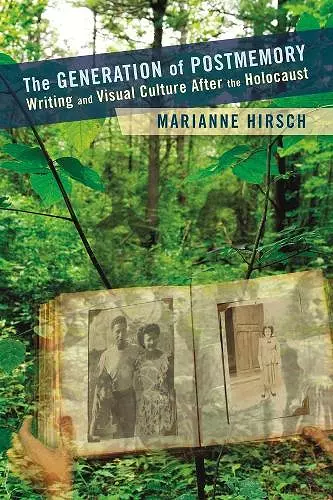The Generation of Postmemory
Writing and Visual Culture After the Holocaust
Format:Paperback
Publisher:Columbia University Press
Published:10th Jul '12
Should be back in stock very soon

The Generation of Postmemory a brilliant text that movingly examines the ineluctable abyss between reality as we find it now and trauma as it was lived by those who were forced to undergo the Holocaust. -- Brett Kaplan, author of Landscapes of Holocaust Postmemory
Can we remember other people's memories? The Generation of Postmemory argues we can: that memories of traumatic events live on to mark the lives of those who were not there to experience them. Children of survivors and their contemporaries inherit catastrophic histories not through direct recollection but through haunting postmemories--multiply mediated images, objects, stories, behaviors, and affects passed down within the family and the culture at large. In these new and revised critical readings of the literary and visual legacies of the Holocaust and other, related sites of memory, Marianne Hirsch builds on her influential concept of postmemory. The book's chapters, two of which were written collaboratively with the historian Leo Spitzer, engage the work of postgeneration artists and writers such as Art Spiegelman, W.G. Sebald, Eva Hoffman, Tatana Kellner, Muriel Hasbun, Anne Karpff, Lily Brett, Lorie Novak, David Levinthal, Nancy Spero and Susan Meiselas. Grappling with the ethics of empathy and identification, these artists attempt to forge a creative postmemorial aesthetic that reanimates the past without appropriating it. In her analyses of their fractured texts, Hirsch locates the roots of the familial and affiliative practices of postmemory in feminism and other movements for social change. Using feminist critical strategies to connect past and present, words and images, and memory and gender, she brings the entangled strands of disparate traumatic histories into more intimate contact. With more than fifty illustrations, her text enables a multifaceted encounter with foundational and cutting edge theories in memory, trauma, gender, and visual culture, eliciting a new understanding of history and our place in it.
Marianne Hirsch's writings provide us with a varied and complex vocabulary for thinking and writing about the long intergenerational legacy of the Holocaust. Her supple writing wrestles with ghosts, images, shadows, survival, loss and all that we project onto the empty canvas of the aftermath. Moving, urgent, and necessary, this book opens up new ways of thinking about family, relationality, kinship, inheritance, and survival in the wake of cataclysmic violence. -- Judith Halberstam, author of The Queer Art of Failure Marianne Hirsch explores the aftermath of genocide as few scholars have. She is both a brilliant reader of texts (photographs, artifacts, literature, and digital images) and an incisive theorist. As she clarifies the fractured forms of post-Holocaust art and literature, she demonstrates the value of imagination as restorative and as rich and layered in its inter-generational complexities. A groundbreaking book that has broad meaning for the study of traumatic memory and its creative aftermath. -- Peter Balakian, author of Black Dog of Fate: An American Son Uncovers His Armenian Past With her crucial distinction between 'familial' and 'affiliative' postmemory, Marianne Hirsch shows how the transmission of traumatic experiences occurs not only within families but also across a much wider social field. Her emphasis on the role of gender in this mediating process is illuminating. The Generation of Postmemory will be a major reference in Holocaust and genocide studies for years to come. -- Susan Rubin Suleiman, author of Crises of Memory and the Second World War The Generation of Postmemory is Marianne Hirsch's finest and fullest description of her paradigm-changing concept of postmemory. In dialogue with a dazzling array of writers and photographers as well as scholars across the humanities, it shows how the 'hinge generations' that have directly experienced or inherited the traumas of the holocaust and other twentieth-century genocides have sought to conceive and commemorate those staggering losses in the hope of a better future. It also traces Hirsch's own dialectical development as a literary, feminist, visual culture, and Holocaust studies scholar, an intellectual trajectory that she shares with many of the best critics of our time. This book is indispensable. -- Laura Wexler, author of Tender Violence: Domestic Visions in an Age of U.S. Imperialism And this is precisely where the heuristic value of postmemory comes in: it forces us to question, to mobilize the punctum that launches the relationship between history (with a capital H, of course) and memory, and its artistic representations... -- Sonia Combe La Quinzaine Litteraire significant contributions to Holocaust literature, women's and gender history, and memory studies. -- Rochelle Goldberg Ruthchild Women's Review of Books
ISBN: 9780231156530
Dimensions: unknown
Weight: unknown
320 pages